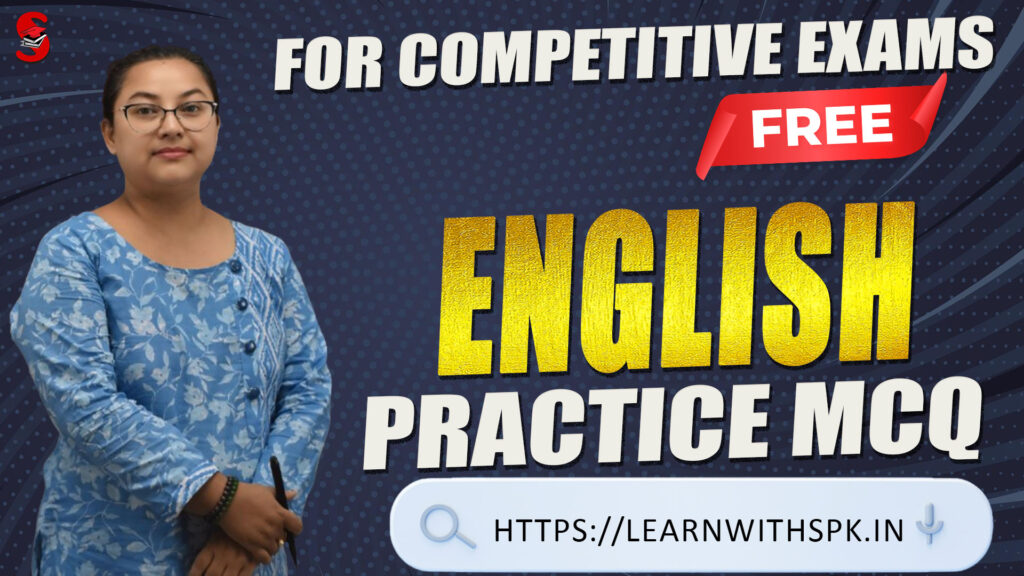Preparing for competitive exams? Practice these carefully curated English MCQs to boost your grammar, vocabulary, and comprehension skills. Each question is provided with the answer, so you can check your progress instantly and prepare with confidence.
What to Expect in This Set?
This set of English practice MCQs for competitive exams covers a wide range of topics essential for exam success. Aspirants can expect questions on grammar, vocabulary, reading comprehension, sentence improvement, error spotting, and verbal ability. The MCQs include various formats such as multiple-choice questions, fill-in-the-blanks, cloze tests, parajumbles, and sentence correction.

The questions are designed to test knowledge of parts of speech, verb tenses, prepositions, synonyms and antonyms, idioms and phrases, sentence structure, and more. These practice questions reflect the pattern and difficulty level commonly found in exams like SSC, Banking, Railways, UPSC, and other government job tests.Overall, this set aims to sharpen your grammar skills, enhance vocabulary, improve reading comprehension, and boost confidence in tackling English sections in competitive exams
Key Topics Covered:
A short section listing the main areas tackled by the questions, such as:
- Grammar and Usage
- Vocabulary (Synonyms/Antonyms)
- Reading Comprehension
- Error Spotting
- Sentence Improvement.
MCQ Set:
1. You must ….. your career with all seriousness. আপুনি আপোনাৰ কেৰিয়াৰটো সকলো গুৰুত্বসহকাৰে ….. কৰিব লাগিব।
(a) Follow অনুসৰণ কৰা
(b) Complete সম্পূৰ্ণ
(c) direct প্ৰত্যক্ষ
(d) Pursue অনুসৰণ কৰা
2. Making pies and cakes ____Mrs. Reddy’s speciality.পাই আৰু কেক বনোৱা ____মিচেছ। ৰেড্ডীৰ বিশেষত্ব।
(a) Are
(b) Were
(c) Is
(d) has
3. The deserted garden was infested ___weeds. নিৰ্জন বাগিচাখনত ___ অপতৃণৰ আক্ৰমণ আছিল।
(a) For
(b) Into
(c) on-
(d) With
4. He went there____. তেওঁ তালৈ গ’ল____ ৷
(a) walking on foot
(b) by foot
(c) with foot-
(d) on foot
5. After your long illness ____I am happy to see you. তোমাৰ দীৰ্ঘদিনীয়া অসুস্থতাৰ পিছত ____তোমাক দেখি মই সুখী।
(a) up and about
(b) by and by
(c) up and down
(d) up and round
6. When the morning ___the murder was discovered. যেতিয়া ৰাতিপুৱা ___হত্যাৰ আৱিষ্কাৰ হৈছিল।
(a) Came আহিছিল
(b) Happened ঘটিছে
(c) Arrived আহি পালে
(d) Occurred ঘটিছিল
7. The smell of the Sea called ___memories of her childhood. সাগৰৰ গোন্ধে তাইৰ শৈশৱৰ ___স্মৃতি বুলি মাতিছিল।
(a) On
(b) Back
(c) Up
(d) For
8. He has the full facts____ but is deliberately hiding them. তেওঁৰ হাতত সম্পূৰ্ণ তথ্য____ আছে যদিও ইচ্ছাকৃতভাৱে লুকুৱাই ৰাখিছে।
(a) under his sleeves
(b) upon his sleeves
(c) up his sleeve (secret)
(d) in his sleeves
9. The appearance of the city____ day by day. চহৰৰ ৰূপ____ দিনক দিনে।
(a) could change
(b) Changed
(c) had changed
(d) is changing
10. The police fired on the mob when it ____. আৰক্ষীয়ে গোটটোৰ ওপৰত গুলীচালনা কৰে যেতিয়া ই ____ ।
(a) turned noisy কোলাহলপূৰ্ণ হৈ পৰিল
(b) turned violent হিংস্ৰ হৈ পৰিল
(c) became abusive গালি-গালাজ কৰা হৈ পৰিল
(d) fizzled out ফিজল আউট
11. There were so many ___ points in his speech that the audience___ to get the message. তেওঁৰ ভাষণত ইমানবোৰ ___ পইণ্ট আছিল যে দৰ্শকে___ বাৰ্তাটো পাবলৈ।
(a) superficial – listened তলৰ পৰা – শুনিলে
(b) relevant – hastened প্ৰাসংগিক – খৰখেদাকৈ কৰা
(c) interesting-tried আকৰ্ষণীয়-চেষ্টা কৰা
(d) irrelevant – failed অপ্রাসংগিক – বিফল
12. The little boy ran ___fast that he was ____for breath. সৰু ল’ৰাটোৱে ___বেগেৰে দৌৰি গ’ল যে সি উশাহৰ বাবে ____।
(a) So-gasping ইমান-হাঁহি হাঁহি
(b) too-fighting অত্যধিক যুঁজ দিয়া
(c) so-inhaling তেনেকৈ উশাহ লোৱা
(d) very-struggling অতি সংগ্ৰামী
13. He was so ____at his job that he was asked to give a to____ the visitors. তেওঁ নিজৰ চাকৰিত ইমানেই ____ আছিল যে তেওঁক দৰ্শনাৰ্থীসকলক____ এটা দিবলৈ কোৱা হৈছিল।
(a) Adept demonstration নিপুণ প্ৰদৰ্শন
(b) able-disclosure সক্ষম-প্ৰকাশ
(c) agile-demolition চঞ্চল-ভাঙি পেলোৱা
(d) accurate display সঠিক প্ৰদৰ্শন
14. She was so ___that she was ___by all. তাই ইমানেই ___ আছিল যে তাই সকলোৰে ___ আছিল।
(a) proud: respected গৌৰৱান্বিত: সন্মানিত
(b) excellent: warned উৎকৃষ্ট: সতৰ্ক কৰি দিয়া হৈছে
(c) talented: praised প্ৰতিভাশালী: প্ৰশংসিত
(d) stupid: admired মূৰ্খ: প্ৰশংসিত
15. The ___of the ‘chief was___ upon him. ‘মুখ্যৰ ___ তেওঁৰ ওপৰত আছিল___।
(a) title, bestowed উপাধি, প্ৰদান কৰা
(b) name, dismissed নাম, চাকৰিৰ পৰা বৰ্খাস্ত কৰা
(c) title, imposed উপাধি, জাপি দিয়া
(d) appointment, thrown নিযুক্তি, নিক্ষেপ কৰা
Practice Summary:
This section highlights the core skills developed through the practice set, including understanding question patterns, vocabulary building, grammar application, and comprehension strategies. Focusing on these essential skills helps strengthen overall language proficiency, boosts exam confidence, and prepares learners to perform confidently in competitive exams. Practicing these skills regularly ensures better accuracy and faster thinking during the actual test.
Frequently Asked Questions (FAQs)
These MCQs are ideal for aspirants preparing for competitive exams such as ADRE, SSC, Banking, Railways, UPSC, and other government job tests who want to improve their English language skills.
The practice questions cover grammar, vocabulary, sentence correction, error spotting, comprehension, synonyms, antonyms, and other essential English language topics.
Yes, every question is followed by the correct answer.
Daily practice of 15-30 minutes is recommended to reinforce learning and build exam confidence gradually.
Absolutely. These questions are designed to align with the syllabus of most competitive exams and help with quick revision before tests.